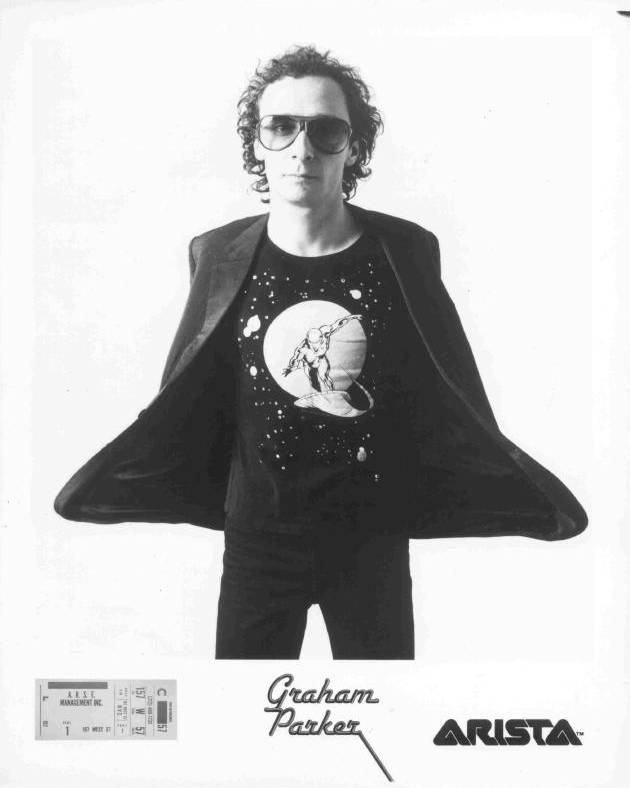

BIOGRAPHY
ARISTA RECORDS, INC.
ARISTA BUILDING
6 WEST 57 STREET NEW YORK, N.Y. 10019
In one of those rise-to-fame tales
that makes so much poetic sense it sounds like a publicist's fabrication,
Parker was working in a gas station in Surrey, England when he
sent a tape he'd made to the Hope and Anchor pub, a showcase for
a number of Britain's best rock and roll bands. Dave Robinson
who managed a recording studio on the premises, heard the tape,
contacted Parker and matched him up with The Rumour, the members
of which coalesed from the scattered remains of Brinsley Schwarz,
Ducks Deluxe and Boutemps Roulez. A new version of one of Parker's
songs was aired on Radio London's Honky Tonk show, and
a record contract followed forthwith.
That was the start of Parker's professional
career, but music had been his life's cornerstone for years before
that, since his exposure to the early Rolling Stones. Music, he
told writer Robert Hilburn, "was always the main thing. You
went to school and did this or that, but the real thing was what
was on the charts." He got a guitar and formed a group called
The Black Rockers, later called The Deep Cut Three; the repetoire
was hard-edged R&B: Stax-Volt, Chess-type stuff, some Motown
("You Can't Hurry Love," in fact, stayed in the G.P.
& The Rumour set for quite a time). But it didn't happen,
and he took a series of frustrating jobs: breeding animals for
scientific experiments, working in a bakery, washing windows.
Then, The Rumour. Flanked by Brinsley
Schwarz, Martin Belmont (guitars), Bob Andrews (keyboards), Andrew
Bodnar (bass) and Steve Goulding (drums), and with Nick Lowe,
ex-of Brinsley's band, producing, Parker recorded his first album,
Howlin' Wind, acclaimed immediately on both sides of the
Atlantic as "rock'n'roll of classic stature" (Crawdaddy).
This was in 1976, the year of Parker's ascendance. As tough as
he sounded on record, he pounded it out even more forcefully live.
An "official" bootleg LP recorded at Marble Arch proved
that to anyone who hadn't yet had the fortune of seeing Parker
and The Rumour on stage.
The music came barreling through:
a second, equally raved-about album, Heat Treatment (the
title song of which was featured in the movie Between The Lines),
a four-song single originally pressed on pink vinyl and dubbed,
therefore, The Pink Parker (with the exceptional "Hold
Back The Night"). All this, and increasingly well-received
tours of the U.S., made Parker a true rock and roll contender.
Rolling Stone gave Parker and The Rumour their "Red
Suspenders Award" for New Band of '76; the two LPs finished
2nd and 4th in the 1976 Pazz & Jop Critics Poll in the Village
Voice "(the year of Graham Parker," the Voice
said), six of the seven writers represented in the Boston Phoenix
pop poll placed one or both Parker LPs in their top ten best of
the year lists.
"To me it is like desperation
to make music. It's like life and death."
In songs like "Back To Schooldays,"
"Fool's Gold," "Pourin' It All Out," "Soul
Shoes," "Not If It Pleases Me," all from those
epochal first two albums, Parker made his stand. Explaining his
band's appeal to Newsweek, Parker said, "We have a freshness
that has been lacking for some time." That freshness continued
to show itself on the next albums, Stick To Me, an LP influenced
by his American experiences, and The Parkerilla, a live
package of some of his best material.
Squeezing Out Sparks.
Ten new Graham Parker songs that bristle with anger, conviction
and barely contained danger. The album drives relentlessly forward,
railing against forces inward ("Nobody hurts you harder than
yourself") and outward. Some of the subjects are familiar
-- local girls, Saturday night, twisted love. And some tracks
deal with universal matters -- abortion (on the strongly stated
"You Can't Be Too Strong"), U.F.O.'s -- in straight
forward rock form. The treatments are never anything but bracingly
original. As Parker himself has said. "I think we're making
the most progressive music on the planet at the moment."
Rock and roll is in good hands if Graham Parker is the wave of
its future.
Back to GP album discography | GP promos and more